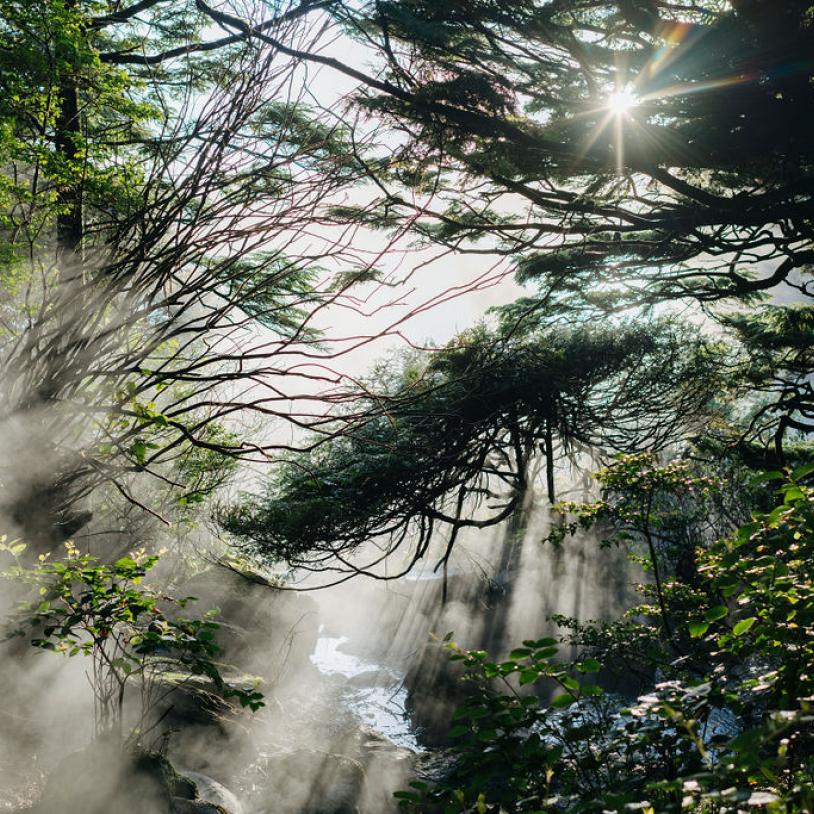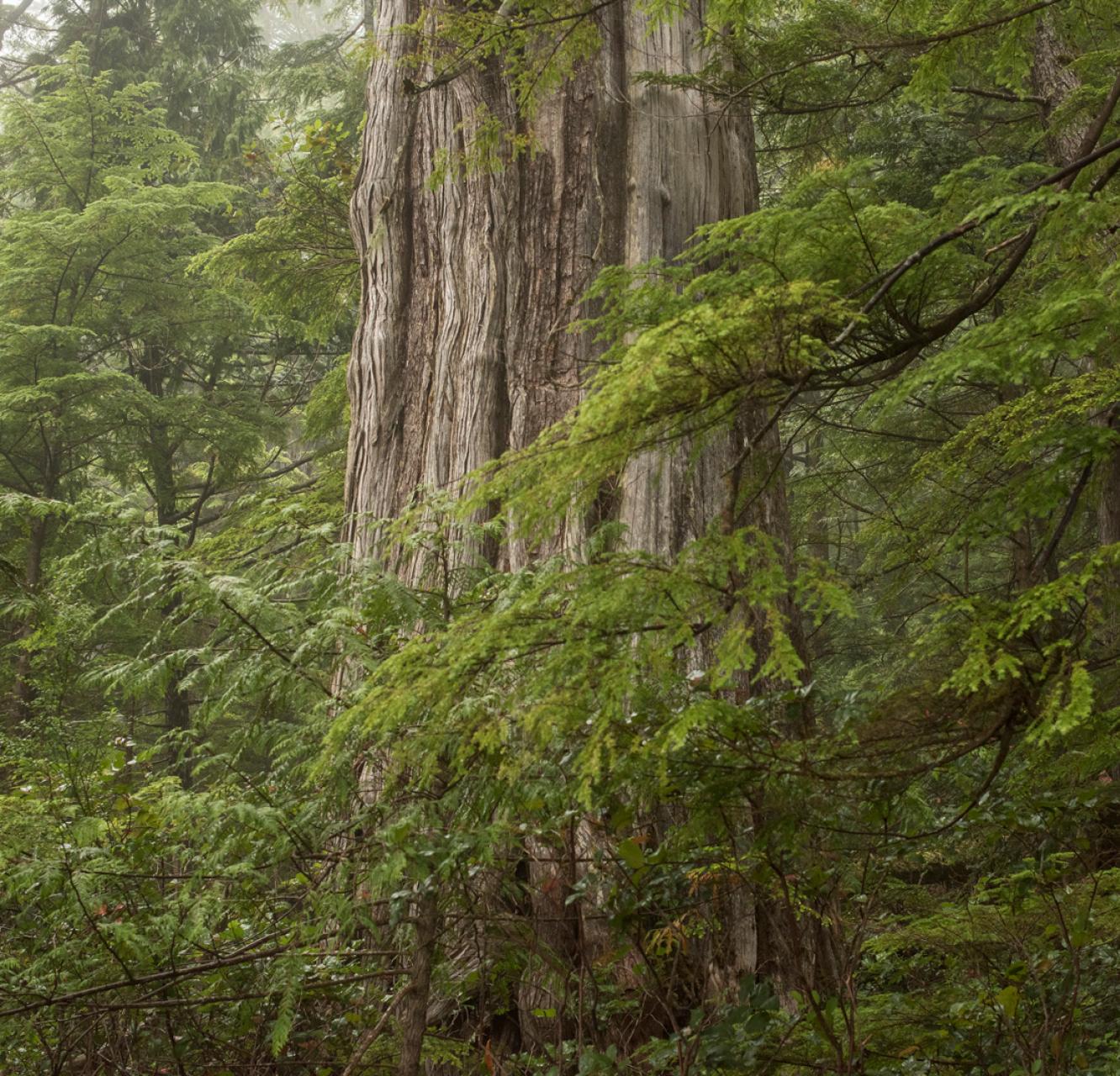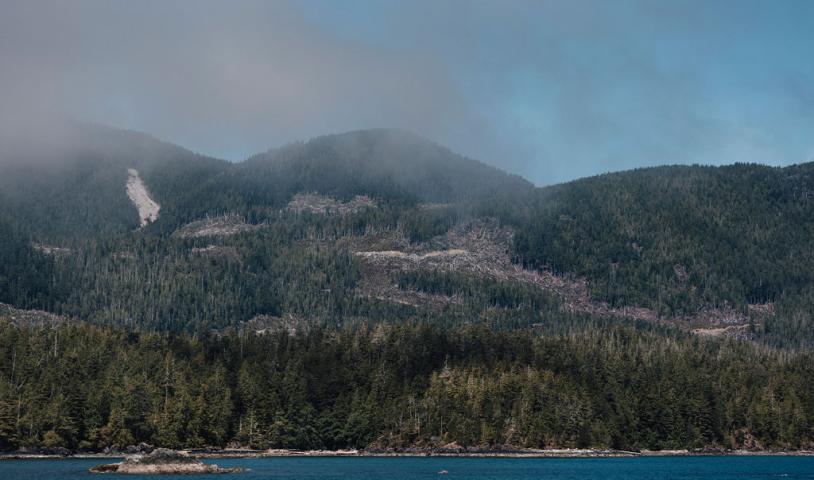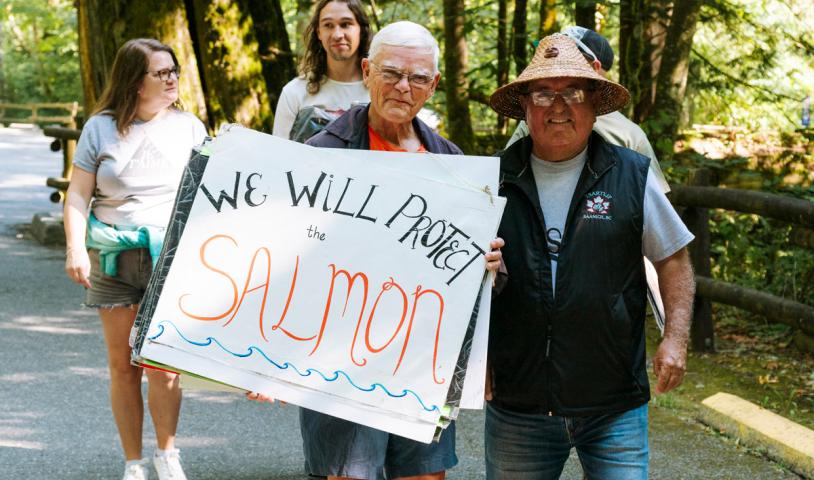Three‑quarters of at‑risk old‑growth forests in B.C. are still without logging deferrals
Wednesday, March 9, 2022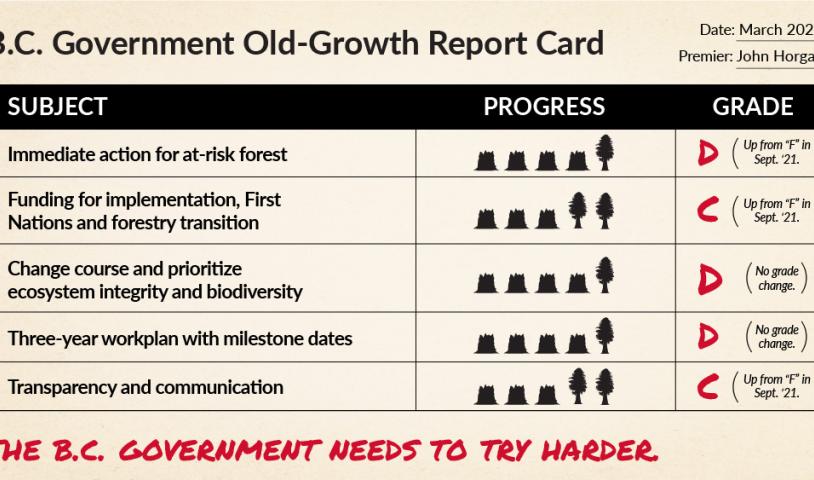

Environmental groups and First Nations give provincial government poor grades as old-growth logging continues
VICTORIA (Unceded Lekwungen Territories) — In the 18 months since the B.C. government promised to implement the recommendations of the Old-Growth Strategic Review (OGSR) panel, only 24 per cent of the most at-risk old-growth forests have been deferred from logging.
The findings are part of an assessment by the Ancient Forest Alliance, Sierra Club BC and Wilderness Committee, who today issued a report card grading the B.C. government’s progress on implementing the recommendations of the OGSR panel. This is the third report card issued since the panel’s recommendations were released on September 11, 2020, and falls at the halfway point of the three-year framework the panel laid out.
The OGSR panel’s recommendations included taking immediate action to protect at-risk old-growth forests and a paradigm shift away from a focus on timber value and towards safeguarding biodiversity and the ecological integrity of all forests in B.C.
“The B.C. government has taken some small, slow actions, but has not delivered the fundamental change it promised in the wake of the old-growth panel’s report and in the last provincial election,” said Torrance Coste, national campaign director for the Wilderness Committee. “Premier John Horgan has set some nice intentions for old-growth forests, but done very little to actually limit logging of the most endangered stands – this is more talk-and-log, not the beginning of a paradigm shift.”
Using the limited publicly available data around confirmed old-growth deferrals and logging, the three organizations have calculated that in the 18 months since the Horgan government committed to these recommendations, approximately 624,000 hectares or 24 per cent of the 2.6 million hectares of the most at-risk old-growth has been confirmed for deferral or a pause on logging.
The past year has seen the establishment of a Technical Advisory Panel to provide expert guidance around old-growth deferrals and the announcement of the government’s intention to defer logging in 2.6 million hectares of the most at-risk old-growth in November 2021. For the first time, the government has adopted a scientific assessment of the state of old-growth forests in B.C., with a priority on protecting the biggest and oldest trees. But the various announcements and new processes haven’t resulted in substantial on-the-ground protection for threatened forests.
The government’s approach has been criticized by environmentalists and Indigenous leaders as putting unfair pressure on First Nations without providing adequate resources and support.
“The BC NDP government has dodged its responsibility to take swift action and despite all the words and promises, chainsaws continue to roar and threatened old-growth forests across BC remain without protection,” said President of the Union of BC Indian Chiefs Grand Chief Stewart Phillip. “Premier John Horgan promised permanent protection of old-growth forests, but without providing a clear plan and adequate resources his government has put First Nations in an impossible position – moving slowly is no longer an option if we’re serious about leaving old-growth for our children and grandchildren.”
Last year, the province made some funding commitments to help First Nations review deferral options and support forestry workers impacted by deferrals. Budget 2022 included $185 million to help workers and communities and enable deferrals. This funding commitment is a significant step but not enough to enable both short-term deferrals and lasting Indigenous-led conservation solutions. The federal government has pledged $2.3 billion to achieve protection of 30 per cent of Canada’s landmass by 2030 but the B.C. government has yet to embrace this target and use this opportunity to secure a significant portion of these federal funds to support old-growth protection.
“The B.C. government has taken a step in the right direction in funding for old-growth,” stated Ancient Forest Alliance campaigner and photographer TJ Watt. “However, they’ve fallen short on the amount needed to relieve the economic pressure faced by First Nations so that logging deferrals can become an economically viable option. This funding shortfall makes enacting the full suite of old-growth logging deferrals virtually impossible to achieve. B.C. also has a golden opportunity to obtain hundreds of millions in federal funding to support the creation of new Indigenous Protected Areas. It’s high time they embraced this.”
Of the 2.6 million hectares recommended for deferral in November 2021, the province hasn’t provided consistent updates on how much has been deferred to date.
“We are halfway through the timeline laid out in the old-growth recommendations Premier John Horgan promised to implement, but only a small amount of the most at-risk forest in B.C. is temporarily off the chopping block and there is still no path to permanent protection,” said Jens Wieting, senior forest and climate campaigner with Sierra Club BC. “With every day of delay, irreplaceable ancient forests, the web of life that depends on them and our last defence against the climate crisis are clearcut. We must stop the bleeding now.“
Ancient Forest Alliance, Sierra Club BC and Wilderness Committee are calling on the B.C. government to: immediately defer logging in all at-risk old-growth forests while compensating for any lost revenue for First Nations, increase funding to support deferrals, economic transition and permanent protection to at least $300 million, implement legislation to protect biodiversity across B.C., establish a plan with milestones consistent with the OGSR framework and regularly publish accurate and detailed progress updates on the deferral process.
-30-
Download a PDF of the full report card.
Download a JPEG version of the full report card.
For more information, please contact:
Grand Chief Stewart Phillip, President of the Union of BC Indian Chiefs
250-4905314
Torrance Coste, National Campaign Director, Wilderness Committee
250-516-9900, torrance@wildernesscommittee.org
Jens Wieting, Senior Forest and Climate Campaigner/Science Advisor, Sierra Club BC
604-354 5312, jens@sierraclub.bc.ca
TJ Watt, Campaigner and Photographer, Ancient Forest Alliance
tj@ancientforestalliance.org
